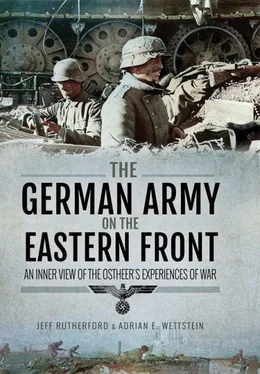The OKH’s order of October 1940 was complemented by the much more radical criminal orders (see chapter 5) issued in the lead-up to Operation Barbarossa in spring and summer 1940. These orders framed the war as an ideological one from the start and both officers and enlisted men used Nazi racial rhetoric as a means of understanding the extremely violent conflict unleashed by the German invasion. The following order, issued by the 7th Infantry Division less than two weeks after the beginning of the attack, displayed how the army placed members of the Red Army into the racial categories devised by the Reich government. [14]
The enemy has defended himself in the past fighting extraordinarily tenaciously, sometimes – even in desperate situations – to the bitter end. Due to this dogged style of combat , our own casualties are also increasing. The Russian, as a dull half-Asian, believes the principle drummed into him by his commissars that he will be shot during any capture. This is the main reason that he doesn’t surrender.
Leaflets have been dropped in an increasing manner with the slogan: ‘Come to us, you will be treated decently, everything else is a lie.’ These leaflets have shown good effect in many places and therefore save blood on our side. In order not to contradict this propaganda, it is necessary to treat Red Soldiers who surrender and have possibly seen the leaflet as prisoners of war .
Necessary executions are as a rule therefore to be carried out so that civilians or other prisoners are unaware of them.
The order also betrays what was becoming an increasingly common practice on both sides of the front: the cold-blooded execution of surrendering troops. While the division attempted to convince the men of halting such a practice in hopes that Soviet soldiers would willingly lay down their arms, its use of terminology such as ‘a dull half-Asian’ only further perpetuated the notion of the Red Army man as the ‘other’, and this made such executions that much easier.
The view of Red Army soldiers as fundamentally different from German soldiers – either biologically or spiritually – clearly emerged from an entry in the 121st Infantry Division’s Signal Unit’s war diary from the summer of 1941. [15]
What animal-like and completely inhuman impressions the first prisoners made on us – completely depraved figures! Or human beings, whose joyless existence that they had to lead, can really be read in their eyes. So appeared the inhabitants of the paradise of workers and peasants! Instinctively we are seized by horror when we imagine how, in the reverse case, these guys would go about in our Heimat with our relatives. Once again, how true the words of the Führer would have been when he said that the victory of Bolshevism would mean the destruction of culture and Europe.
Here, in the 10–15 kilometre deep forests, is their very own combat area. For our infantry, however, this deployment means an enormous adjustment, in that the Reds have different tactics in forest fighting that had been usual before with the English, French and Poles.
The Asiatic impact makes itself noticeable. Treachery and duplicity, combined with a superb knowledge of the terrain, are the primary advantages of the Red Army’s soldiers.
The officer fights together with his soldiers. Yet, it’s the surveillance system of the commissars that forces him [to fight]. Undoubtedly the weaponry is qualitatively and quantitatively good, for despite the shouts of peace for international fraternization and human rights, Russia has rearmed for years in order to prepare for world revolution.
The greatest threat, however, is the innate nature-instinct of the inhabitants of the Russian steppe. The abilities to orient in unfamiliar terrain, to read the trails and tracks, and to adapt to nature, are for us Central Europeans in our large cities, long ago withered away and lost.
Ideological beliefs – both Nazi and those that existed in German society before January 1933 – permeate this document. While ‘the Asiatic impact’ manifested itself in ‘animal-like and completely inhuman impressions,’ it also proved to be an advantage for the Red Army, as its allegedly primitive soldiers were more adept at fighting the ‘devious’ war that raged in cornfields and forests. The Bolshevik system had not only produced the necessary weaponry for the Red Army, but its ‘surveillance system’ – or its use of commissar and politruks – was what kept the army in the field.
Another German source discussed similar themes in trying to explain the Soviets’ tenacious defence: [16]
Copy: Compilation of Observations on the Red Army (from A.E. Frauenfeld [17])
The resistance of the enemy was exceptionally tough and courageous everywhere. Especially noteworthy was that the enemy’s Luftwaffe was as good as completely unnoticed…
The battle was [ skillfully ] led by Russian infantry, with handguns, machine guns and anti-tank guns, anti-aircraft guns and mortars.
The astounding bravery, with which the small and smallest groups defended themselves and the scattered remnants and individuals fought until destruction, stands in a stark contrast to prisoner of war statements that unanimously and truthfully report that food is really insufficient for them, that they have had nothing to eat for days.
The explanation is to be looked for in that:
The members and above all the functionaries of the Bolshevik Party fight well. They doubtlessly constitute an elite, who see in their duty an example for the others. There are numerous examples for this.
Another group fights well due to other motives. There are Kyrgyzs, Tatars and all the members of war-like but primitive peoples. For them, there are – similarly as with the niggers in France – only two possibilities in war: either they kill the enemy or he kills them. Surrounded and caught in a hopeless situation, they defend themselves out of desperation.
By the end of summer 1941 at the latest, the German army and its soldiers recognized that the war in the Soviet Union was waged against an opponent far different from any previous campaign. According to the Germans’ cynical view, the ‘primitive peoples’ that filled the Red Army’s ranks were motivated by the example and coercion of Communist Party members and commissars to carry out their duties.
This discussion of the Bolshevik state was picked up on by another soldier, whose sometimes perceptive analysis of the Soviet Union nevertheless betrayed both traditional and Nazi prejudices. [18]
In a centuries-long school of suffering, especially in the last three decades of Bolshevik rule, the Russian people has become a victim of nihilism. That was also often the judgment of war correspondents, who described that life for the Bolshevik people had nothing to offer. It was joyless and not overly worth living. One was summoned to the living hell and the empire of shadows. Did one need to be afraid of death? Death ended the animal existence and brought all suffering to an end. Had we ever seen symbols of the love of life or even a heartily laughing people on our long march in Russia? Under the ice cold of mistrust and the animalistic look of people, the longing for a better life had long died away. The man was robbed of his dignity, without which the outer and inner freedom cannot exist. Now the Russian man also may not have had outer freedom in the Tsarist time, but he could sound and shout out with joy the longing for this freedom in simple and warm-feeling songs of his church. Today even the inner freedom has been taken by the bloodsuckers in Moscow. They pushed down the people to the level of the animal. They take from him every moral feeling for honour and responsibility. The fanatical Red Army man shoots down the opponent from a distance of three meters and possessed the gall to tap his comrade on the shoulder in a friendly way and ask him for a light for his cigarette. I have observed that more than once. If we soldiers also haven‘t expressed this directly, so we sense, however, that the longed-for paradise in Russia did not meet us. That what we encountered here was the exact opposite!
Читать дальше






![John Stieber - Against the Odds - Survival on the Russian Front 1944-1945 [2nd Edition]](/books/405234/john-stieber-against-the-odds-survival-on-the-russian-front-1944-1945-2nd-edition-thumb.webp)





